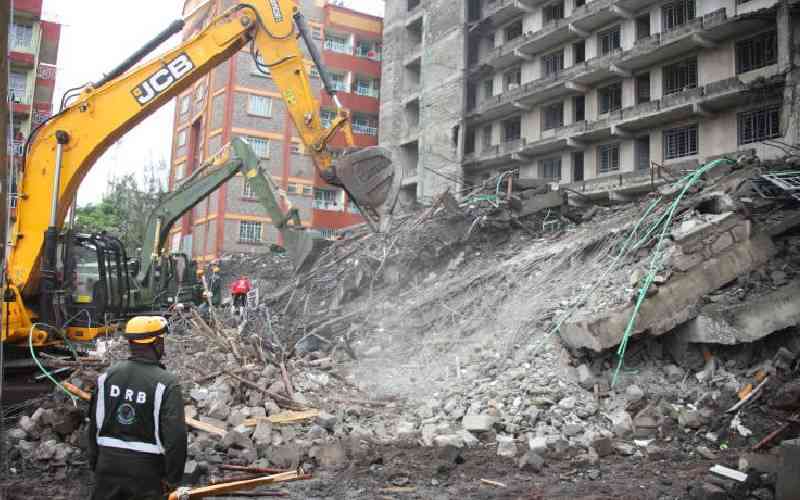
After a number of tall buildings have tumbled in various parts of the country for the past few years, various county governments are upping the monitoring of upcoming storied buildings to avoid disasters.
Being located on the floor of the Rift Valley, Nakuru County officials say there are strict specific building requirements that guide the construction of high rise buildings in the region.
"Controlling the number of floors a building can carry according to the soil holding capacity of a place is very crucial to us," said Nakuru Lands and Housing CEC John Kihagi.
He said the growth in population had forced the construction of modern and affordable storey houses in the city and different parts of the county owing to the scarcity of land for expansion.
"Scarcity of land had contributed to the construction of such houses (storey) amid a boom in population," said Kihagi.
Most of this work is mainly done by private developers as the construction industry takes shape despite the harsh economic constraints facing the country at the moment.
"Ours is to monitor and approve plans that are in tandem with the soil holding capacities of houses in different areas so that to ensure we follow the right procedures and the use of the right personnel and building materials in the storey constructions," said Kihagi.
"We need to keep our building standards up in order to our populations safe in well-constructed residential and commercial buildings in the city and beyond, a move that also pulls in investors."
Nairobi County is also planning to do an audit of the city's buildings to identify those built without proper approvals and demolition them if need be.
Nairobi County's Built Environment and Urban Planning Chief Officer Patrick Analo, in previous remarks, noted that the city is developing rapidly at a rate of four per cent hence the need to address the rapid urbanisation.
He revealed that the County has developed four policies some of which are at various levels of enactment. The policies include the Nairobi City County Development Control Guidelines Policy, Nairobi City County Land Use Policy, Property Numbering and Street Naming Policy.
Analo said that the county will work with built environment professionals to audit the current buildings in risk-prone areas of Nairobi's Eastlands such as Pipeline, Tassia, Kayole, Dandora, Mwiki, and Dagoretti among others for safety.
''Those that will meet the minimum requirements standards of building code and other requirements will be given approval under the framework of regularisation. Those that will not meet the structural integrity will be advised accordingly including adjustments and modification or even demolition,'' he said.
According to the National Construction Authority (NCA), in the past five years, about 200 people have lost their lives as a result of buildings collapsing.
A 2018 report by NCA indicated out of 14,895 buildings audited across the country, 10, 791 were unsafe for occupancy and needed reinforcement and demolition, 723 of them were deemed dangerous, 1,217 were in fair condition and 2,194 were safe.
The NCA also inspected 26,060 construction projects in this period. Out of the total, they suspended 18,192 (69.8 per cent) of the projects due to non-compliance.
As it stands, the authority said that about 60 per cent of construction projects are non-compliant amid intensified efforts to be consistent in quality checks.
NCA notes that buildings collapse due to flouting of zoning rules and over-development, poor workmanship and rogue developers. Other reasons include the use of substandard material and poor maintenance.
 The Standard Group Plc is a multi-media organization with investments in media
platforms spanning newspaper print
operations, television, radio broadcasting, digital and online services. The
Standard Group is recognized as a
leading multi-media house in Kenya with a key influence in matters of national and
international interest.
The Standard Group Plc is a multi-media organization with investments in media
platforms spanning newspaper print
operations, television, radio broadcasting, digital and online services. The
Standard Group is recognized as a
leading multi-media house in Kenya with a key influence in matters of national and
international interest.
